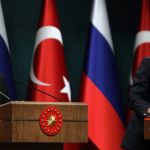Why Turkey Is Pivoting Toward Iran and Russia
Alignments in the Middle East have long been shifting tectonic plates. For decades, regional powers—particularly Iran, Iraq, Israel, Saudi Arabia, and Turkey—have competed to maximize power against the backdrop of interventions by Russia, the United Kingdom, and, later, the United States. Until recently, the United States and its regional allies—Israel, the majority of the Arab Gulf states, and Turkey—were aligned against Iran. In the aftermath of the 2015 Iran nuclear agreement, it seemed certain that these regional powers, backed by Washington, would succeed in isolating the mullahs. But myriad domestic, regional, and international factors have combined to obviate this long-standing status quo. The most significant result of these developments has been Turkey’s drift away from the United States and toward Iran and Russia.
ANKARA’S STRATEGIC PIVOT
There are several reasons for Ankara’s emerging alignment with Tehran and Moscow. First, the ascension of Recep Tayyip Erdogan to the Turkish presidency in 2014—a move that marked his consolidation of power after over a decade as prime minister—signaled a shift in the country’s politics. Erdogan has empowered religious factions and moved the country away from Ankara’s celebrated secularism, which dates back to its founder, Kemal Ataturk, in the early twentieth century. Erdogan’s worldview shares many tenets with those of the Islamic Republic and Russia. Like Moscow and Tehran, Ankara is now more anti-Western than at any point in recent memory. In that sense, Turkey is pivoting away from NATO and toward the two revisionist powers.
Erdogan’s beliefs shape his perception of the regional order. The Turkish president appears to see himself as a modern-day sultan, the rightful heir to Sunni leadership. He has gone so far as to claim that his “is the only country that can lead the Muslim world.” This makes the House of Saud less of an ally and more of a competitor.
The Khashoggi murder is only the latest in a series of developments that have exacerbated tensions between Turkey and Saudi Arabia.
Indeed, the Khashoggi murder is only the latest in a series of developments that have exacerbated tensions between Turkey and Saudi Arabia. In the ongoing rift in the Persian Gulf, in which Saudi Arabia and its allies severed ties with Qatar (ostensibly because of Qatar’s assertive and independent foreign policy, but in reality because of growing tensions stemming from the Saudi approach to Iran and the war in Yemen), Ankara joined Tehran in supporting Doha. For Turkey, the Gulf state was an important ally whose regional outlook aligned with its own. And the two countries’ economic ties were also important to Ankara. Even before the crisis, Turkey had signed a military protocol with Qatar and opened its first military base in the region in 2015. More recently, Turkey signed a deal to purchase Russian-made S-400 missile systems, prompting U.S. Defense Secretary James Mattis to warn Turkey that it should reconsider the move, as NATO wouldn’t be able to integrate these weapons into its order of battle.
These developments have occurred against the backdrop of the Syrian conflict, where the United States and Saudi Arabia have remained united by a long-standing partnership, their respective enmity toward Iran, and the ongoing war in Yemen. For Turkey, the Iran-Russia nexus now seems to be a better fit than NATO. Ankara is preoccupied with stabilizing Syria, even if this means that President Bashar al-Assad remains in power. This objective aligns with Iranian and Russian goals. Moscow and Tehran have worked closely together in Syria—with Russia providing air cover to Iran’s ground troops—to secure both Assad’s grip on power and their own regional status. Both they and Turkey have an interest in preserving Syria’s territorial integrity, which could help them avoid a possible regional fragmentation and state failure that could spill over and threaten their own survival.
Turkey also appears to be more concerned about the Kurds than about ISIS, another factor that aligns it more with Iran and Russia than with the United States and Saudi Arabia. Iran is perhaps better positioned than the United States and NATO to help assuage Turkish concerns regarding the future of the Kurds. Although apparently no party wishes to see the Kurds split from their respective states, Iran—like Turkey—seems to feel acutely threatened by an empowered Kurdish population. For both Iran and Turkey, the dismemberment of Syria and a Kurdish split from the country could lead to a slippery slope emboldening their Kurdish populations and creating a threat to their territorial integrity and national unity.
A residual ISIS presence, meanwhile, provides the Ankara-Tehran-Moscow-Damascus quartet with an excuse to keep their militaries active in the theater. That doesn’t mean these capitals don’t legitimately perceive ISIS as a threat. Instead, they see opportunity in a weakened ISIS whose territorial control and capabilities are largely diminished, allowing them to justify their persistent and at times aggressive military efforts.In fact, Erdogan is even developing closer ties with Tahrir al-Sham, an al Qaeda–linked terrorist group mainly active in Syria and numbering about 10,000 fighters. The group, Erdogan seems to believe, can be directed against the People’s Protection Units (YPG), a Kurdish militia force that Turks reportedly see as empowered by U.S. and Saudi efforts in Syria.
Source: Foreign Affairs

